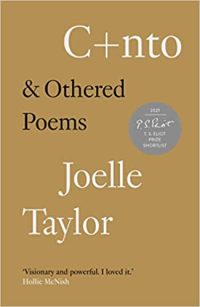C+nto & Othered Poems (Winner, TS Eliot Prize, 2021)
Joelle Taylor’s C+nto & Othered Poems is her third collection of poetry, following Songs my Enemy Taught Me (2017), a gut-wrenching collection about violence against women that weaves her own experiences of abuse together with stories from around the world. Taylor is not simply a poet, but a champion of creativity as activism and balm. As commissioning editor of OutSpoken Press and co-curator of OutSpoken live at the Southbank Centre, she continues to be a vocal supporter and mentor to the performance poetry community, while the impact of her page poetry only grows.
C+nto shares some similarities to Songs in its unflinching attention to the body and its enemies but this new collection returns to her roots both artistic (Taylor was a playwright before she found recognition as a poet) and personal. As in Songs, these are poems of resistance, this time set to the beat of the 90s gay bar jukebox. They remember these places as sanctuary and lament their passing in a time when queer community seems made and unmade on twitter threads rather than dancefloors.
Peppered through this collection of poems celebrating butch lesbians are seven ‘Scene Poems’, stage directions for the subsequent poems, grounding them in space and time.
EXTERIOR night. A main road in London.
LX1: Streetlamps watch a woman pass & text each other.
FX1: The sound of a door opening into a chest cavity.
These are the highlight of the collection, showing Taylor’s striking ability to play in the shadows of words and light up life from within. They trigger that sense of expectation one feels when waiting for a performance to begin, but are stunning evocations in their own right.
The theme of return echoes throughout C+nto; to Taylor’s past, yes, but more importantly to one’s own body, another refrain that carries through from previous work. The visceral, deeply personal understanding of gay bar as homecoming is told so directly it’ll resonate deeply with those who understand the polarities of ostracism and recognition.
The woman pushes open the door & enters her own body[.]
This door is the Maryville, a fictional lesbian pub where the final and longest poem, ‘O Maryville’ is set. ‘Scene Three’ describes a woman entering the Maryville in a skirt and rushing straight to the toilets to re-emerge as herself. Here Taylor is at her best, giving such moments of mundane transformation the vision and care they deserve:
FX2: The sound of air unzipping, the world peeled; a woman giving birth to herself. The cubicle door opens and a butch casually steps out, in tweed trousers, button shirt and blazer.
In these moments we are reminded that such places of belonging were forged out of necessity and must be fought for. As Taylor says in the preface, ‘there is no part of a butch lesbian that is welcome in this world’. Although the collection occasionally veers toward nostalgia, this is not a comfortable past and Taylor makes it clear to the reader that the present can be just as vicious to those who cannot or will not conform.
At the end of the book are two QR codes which link to videos of Taylor performing work from C+nto & Othered Poems. I read along with the performances, which gave an insight into the evolution of poems from stage to page; small changes in the lines felt like clues to Taylor’s process, another demonstration of her creative generosity and willingness to dismantle expectations.
Taylor is a natural storyteller but C+nto shows her confidently striding through a longer narrative style than her previous poetry. It will no doubt find fans within the queer community for its under-the-skin depiction of shared struggle but if anything, C+nto & Othered Poems is about finding community, finding yourself and something worth fighting for; poems anyone might find a complex sort of sanctuary within.
Ellie Julings


Leave a Reply